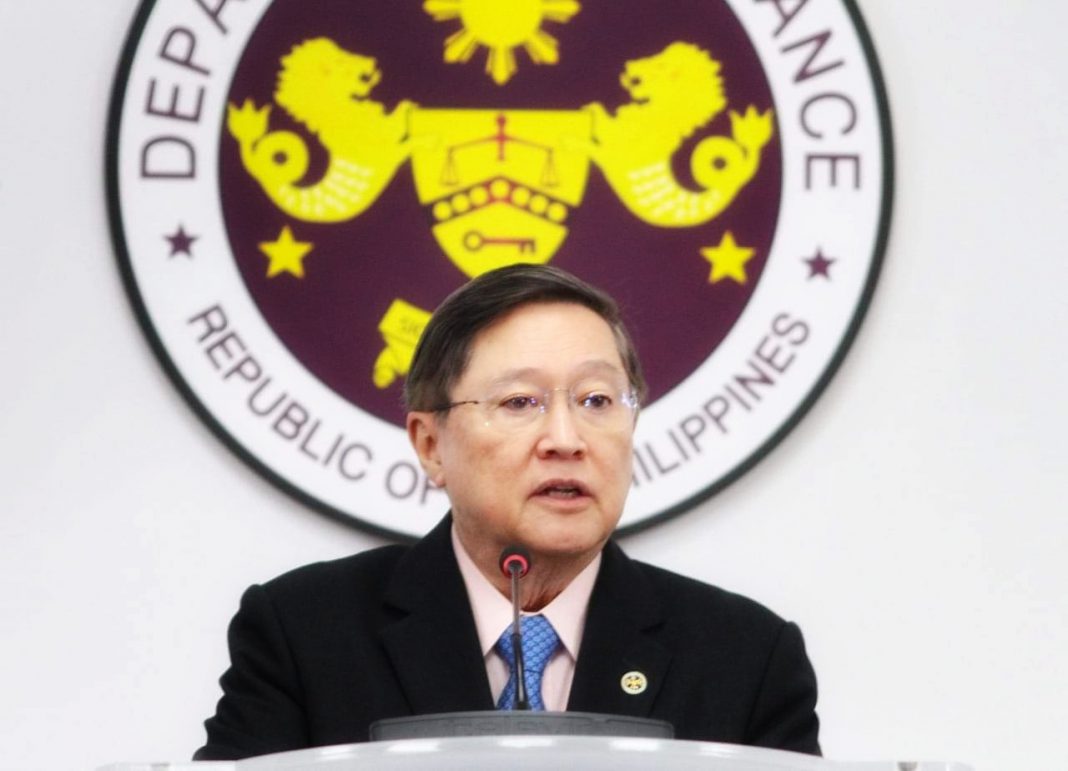By Victoria “NIKE” De Dios
Domestic enterprises should be prepared to vigorously innovate and identify emerging business opportunities as they transition to a digital-based New Economy to enable them and the country to recover quickly from the crisis spawned by the coronavirus pandemic, Finance Secretary Carlos Dominguez III said Friday.
Dominguez said the proposed Bayanihan To Recover As One Act or Bayanihan 2, which was approved and ratified by the Congress, along with other economic priority measures and the continued implementation of the Duterte administration’s “Build, Build, Build” infrastructure program will complete the economic recovery plan meant for businesses to bounce back from the pandemic-induced crisis.
He thanked the Senate and the House of Representatives for approving and ratifying a “fiscally responsible” Bayanihan 2 bill, which is now up for President Duterte’s signature.
The government’s COVID-19 response is “front and center” of this P165-billion Bayanihan 2 stimulus package, which provides funds to hire thousands of contact tracers and various forms of support for medical workers, as well as for the purchase of safe and effective vaccines once they become available, Dominguez said.
“Continuous health system improvements are crucial for bringing back the confidence of our people in the new economy. If we can prevent the need for lockdowns and keep the virus at bay, the people can work, shop, and move around more freely as long as we all comply with the required health behaviors,” Dominguez said in his message to participants of the Visayas Area Business Conference and Sulong Pilipinas session held online via Zoom.
The Philippine Chamber of Commerce and Industry (PCCI) led by Ambassador Benedicto Yujuico and the Cebu Chamber of Commerce and Industry (CCCI) organized these virtual events in partnership with the Department of Finance (DOF).
Dominguez said that ahead of, and even beyond Bayanihan 2, the government will continue to intensify its public health response efforts, as “only a healthy people will ensure a healthy economy.”
He also pointed out that unemployment and reduced incomes resulting from the lockdowns also have public health consequences.
“Rebuilding the economy is a condition for ensuring public health. We cannot fight a pandemic with a weak economy; nor can we restore economic vigor without solving the public health crisis. The health of our people and the strength of our economy are mutually reinforcing,” Dominguez said.
He said the government’s partnership with the business community, particularly with the PCCI, will help drive the country’s reconstruction and recovery from the pandemic.
This year’s Visayas Area Conference, with the theme “Innovation During the Pandemic,” “captures the essence of what we need to do so that our enterprises and our economy can bounce back quickly” from the unprecedented challenge brought about by the economic fallout from COVID-19, Dominguez said.
“The enterprises must be ready to more aggressively innovate, to shift more rapidly to take advantage of new digital technologies, and to identify emerging business opportunities. These are not only moving into the ‘new normal.’ We should be purposefully moving toward a New Economy,” Dominguez said.
He assured the business community that after Bayanihan 2, the Duterte administration will continue to work with the Congress on its other priority measures that are necessary to help the economy bounce back from the pandemic.
These include the swift passage of the Corporate Recovery and Tax Incentives for Enterprises Act (CREATE) bill that will provide an outright 5 percentage point reduction in the corporate income tax rate—from 30 to 25 percent—as soon as it is made effective.
Allowing banks to dispose of non-performing loans and assets through asset management firms; enabling government banks to form a special holding company that will be able to infuse equity, with strict conditions, into strategically important companies facing insolvency; and providing greater support to the agriculture sector by giving the banking system the ability to support the whole value chain of agri-enterprises through amendments to the Agri-Agra Law are the other economic priority bills that the Duterte administration wants the Congress to pass to complete the economic recovery package, Dominguez said.
“While we know that economic recovery is not going to be a sprint, we do have the fiscal stamina for running this marathon. It is to our own advantage to keep our deficit within manageable limits so we can continue to access financing at terms that are favorable to the Filipino people,” Dominguez said.
He said the reforms supported by the PCCI and implemented by the Duterte administration long before the pandemic struck, “has helped the government become better prepared than at any point in recent history for black swan events,” such as COVID-19 that has put lives and livelihoods at serious risk.
“Through the years, the PCCI has been a dependable partner of the government in pushing for key priorities that benefit hardworking businesses and the whole economy. The TRAIN Law or Tax Reform for Acceleration and Inclusion; the amnesties on the estate taxes and delinquencies; and the increases in sin taxes to fund universal health care were passed with the support and contributions of PCCI chapters nationwide,” Dominguez said.
He said PCCI’s continued support for Sulong Pilipinas has led to the enactment of several of the Duterte administration’s other far-reaching reforms, such as the National ID System, Universal Health Care (UHC), Ease of Doing Business (EODB), and the “Build, Build, Build program,”–all of which have helped strengthen the country’s fiscal and economic position.
Such reforms helped the government bring down the country’s debt-to-GDP (gross domestic product) ratio to a historic low of 39.6 percent in 2019; build its gross international reserves (GIR) to an unprecedented $98 billion as of July this year; improve the revenue stream to 16.1 percent of GDP last year—the highest in two decades; achieve its highest-ever credit ratings; and rapidly bring down the poverty rate to 16.7 percent last year, compared to 23.5 percent when the President took over in 2016, Dominguez said.
Moreover, the government was able to quickly access emergency loans from the country’s development partners and the commercial markets at very low rates and longer repayment periods, which provided it a good amount of ammunition to fight the pandemic, he added.
Dominguez also thanked the leaders from the Visayas business community for their active participation in this year’s Sulong Pilipinas sessions.
“Since its launch in 2016, Sulong has played a crucial role in bringing our key stakeholders together in collaborative and participatory workshops in support of game-changing reforms,” he said.
Dominguez said the government’s economic recovery strategy remains anchored on the “Build, Build, Build” program, as it not only “creates jobs, fires up consumption, and spurs productive activity” but will “also help to rapidly decentralize the economy and cure the present vulnerability where the concentration of business activity is also the concentration of infections.”
He said that even before the pandemic, Visayas has already become a major growth center and a key contributor to the economy as a result of massive investments in infrastructure, which include the Mactan-Cebu International Airport that is now fully operational after its inauguration in 2017; and the Bohol-Panglao International Airport that was inaugurated in 2018 and is the country’s first eco airport.
Other big-ticket projects in the Visayas are the Bacolod-Negros Occidental Economic Highway, which is expected to be completed in 2024; and the Cebu-Mactan Fourth Bridge, which includes a 4.9-kilometer four-lane Coastal Road construction project.
“These developments underscore the commitment of the Duterte administration to move ahead with our Build, Build, Build program even amidst the global health and economic crisis brought about by the contagion. These investments will primarily fuel our plan to quickly and smoothly get back to our growth trajectory upon the defeat of COVID-19,” Dominguez said.
Before the close of the Sulong Pilipinas-Visayas sessions, Dominguez, on behalf of President Duterte, accepted the private sector’s top actionable recommendations on how the country can best recover from the pandemic-induced crisis.
“These suggestions will be the building blocks of our sustained recovery efforts,” Dominguez said.
Read related stories:
https://thephilbiznews.com/millions-of-unbanked-pinoys-finally-got-digital-accounts-thru-rcbcs-diskartech/
https://thephilbiznews.com/msmes-welcome-efficient-seamless-system-adapted-in-processing-loan-grants-from-the-govt/














